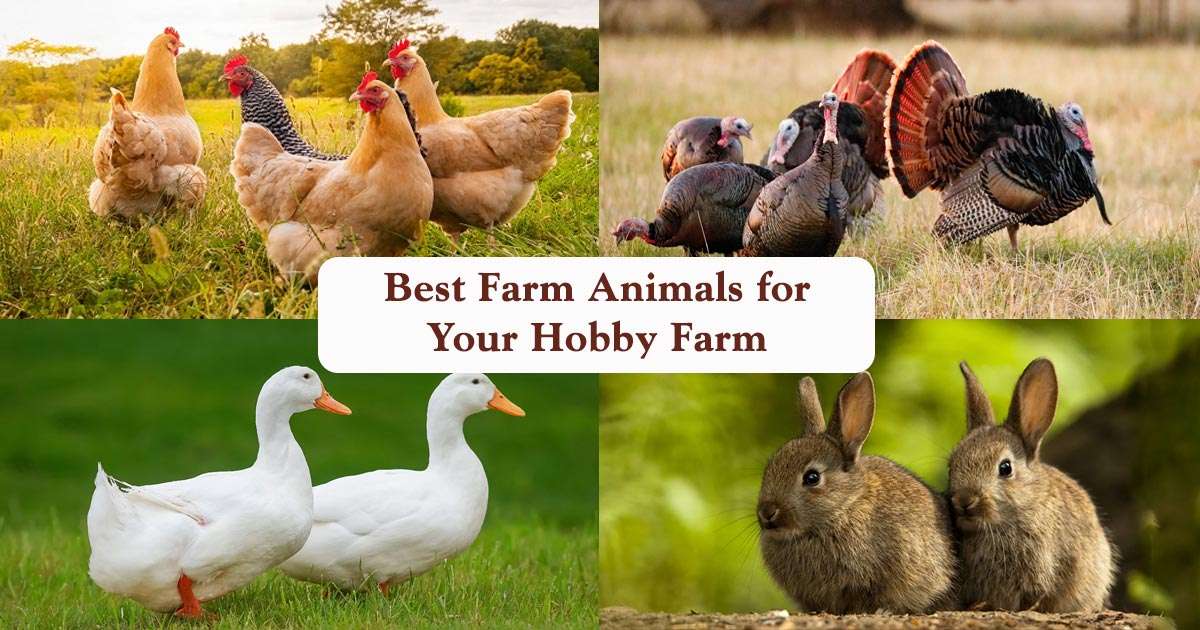Top Farm Animals to Consider for Your Hobby Farm

Starting with a few backyard farm animals often leads to adding more animals, and soon your backyard might resemble Old McDonald’s farm. Adding new animals is exciting, but it’s important to consider your goals and what resources you have, like time, space, and money, to ensure a smooth transition. This planning will help you decide on the best new hobby farm animals to add to your growing farm.
Unique Hobby Farm Animals to Raise
If you’re interested in raising small farm animals on a hobby farm or homestead and aren’t sure where to begin, consider a few breeds that do well in smaller spaces. Here’s some information to help you choose the right ones for your farm.
Chickens
Chickens are a great starting point for anyone new to farming small animals. They’re the best hobby farm animals because they are tough, easy to care for, and affordable to set up. A small group can produce enough eggs for a family, and a larger flock can even support a small egg business. Chickens help by eating food scraps and creating compost for gardens. However, they attract predators, so it’s important to keep them safe. They also produce a lot of waste, so make sure you have a plan to manage it.
Turkeys
Turkeys are generally easy to manage, although raising them from young birds can be challenging. Once they mature, they do well. Selling them for Thanksgiving can be profitable, making them a valuable choice for small farmers.
Ducks
Pekin ducks are easy to care for and make great additions to any yard. They just need a small shelter and some water, like a pond or even a kiddie pool. They can roam in your garden without damaging it, unlike chickens. While ducks are smart and like routine, they may struggle to learn new habits. As adults, they produce large eggs and meat.
Rabbits
Rabbits need a small barn with a dirt floor, pens, and feeders, but they also provide meat and, in some breeds like Angora, fur. They also produce excellent fertilizer for gardens. Rabbits are fairly easy to handle but require regular care to meet their specific needs. While the U.S. market for rabbit meat is smaller than in Europe, keep in mind that harvesting meat or fur means you’ll need to slaughter the animals, which might not be appealing to everyone.
Honeybees
Honeybees are unique small farm animals used for honey production and crop pollination. They are a good choice for hobby farms, particularly if you’re interested in beekeeping. You can get honey and beeswax, which are used in products like lip balm and candles. Bees also help pollinate your and your neighbors’ crops. Starting a beekeeping operation can be costly and, while not time-intensive daily, requires careful and timely attention. It might take some time to learn properly. For advice, consider contacting local beekeepers in your area.
Goats
Goats are tough and useful for clearing land by eating small trees and shrubs. They can handle poor pastures well and produce about three quarts of milk daily. If that’s too much milk for your family, you can make cheese or feed it to other farm animals. However, goats are known for escaping, so they need strong fencing.
If you prefer smaller goats, consider breeds like Pygmy, mini Alpine, or Nigerian dwarf goats. Remember, pygmy goats like company, so make sure you have enough space for a small herd.
Sheep
Sheep can provide meat, milk, or wool, depending on the breed. They need good pasture and protection from predators, so it’s best to keep them close to your house. Sheep’s milk is especially good for making cheese. There are many breeds of sheep that work well on small farms, so choose one that fits your goals for raising them.
Pigs
Pigs are big but don’t need a lot of space; they just need a strong pen to prevent escapes. They eat almost anything, making them great for disposing of food scraps and weeds. Give them enough room to root and wallow. Moving their pen to fresh pasture helps keep their area clean and reduces food costs since they can forage for themselves.
Alpacas
Alpacas are becoming popular on hobby farms for their cute looks, fluffy wool, and ability to thrive in dry conditions. Their wool is softer than cashmere, lighter, warmer than sheep’s wool, and highly sought after by hand spinners because it doesn’t contain lanolin, making it easier to prepare for spinning. Alpacas don’t require much land, making them suitable for smaller farms. However, they do need high fences to keep predators out, a diet of protein-rich second-cut hay, occasional oats during winter, and sometimes a vitamin supplement.
Miniature Horses and Ponies
Miniature horses and ponies are great for hobby farmers who like horses but don’t have much space or experience with them. They behave just like larger horses but are safer due to their size. Ponies are especially good for beginners and can still be quite useful on a small farm.
Here’s how a pony can help out on your farm:
- Natural Lawn Mower: Ponies love to graze and will help keep your grass short.
- Companion Animal: They make excellent companions and can learn tricks. You can even set up small jumps for them, which is fun and good exercise for both of you. Ponies also make good therapy animals.
- Transportation: Although ponies can only carry about 30 kg, they can pull a small wagon, helping you transport light loads around the farm.
- Fertilizer: Pony manure is high in fiber and makes good compost for your plants once it’s properly broken down, helping to enrich your soil.
Miniature Cattles
Miniature cattle are a great choice for hobby farmers because they are quieter and easier to manage than larger breeds. They eat less, mature faster, and their meat is often of higher quality and better taste. These cattle are small, usually standing between 81cm and 121cm tall at three years old, and they only need about 2 to 3 acres of grazing land.
Some popular miniature cattle breeds include:
- Belted Galloway: One of the oldest cattle breeds, known for its calm temperament and double-layered hair that adapts well to various climates. They are excellent milk producers and easy to care for on small farms.
- Dexter: About half the size of traditional Herefords, Dexters are excellent milk producers, yielding up to 95 liters of milk a day.
- Lowline: Originally bred from Angus herds in Australia, this breed is known for its muscular build, resilience, and high fertility. They are naturally hornless and adapt well to various climates.
Find the Best Hobby Farm Animals
If you’re looking to start or expand your hobby farm, consider these diverse and manageable animals that can enrich your life and land. From the joy of fresh eggs and the utility of grazing animals to the delight of producing your own honey or wool, there’s an animal for every size and type of farm. Explore the possibilities and find the perfect fit to transform your hobby farm into a productive and enjoyable retreat.

